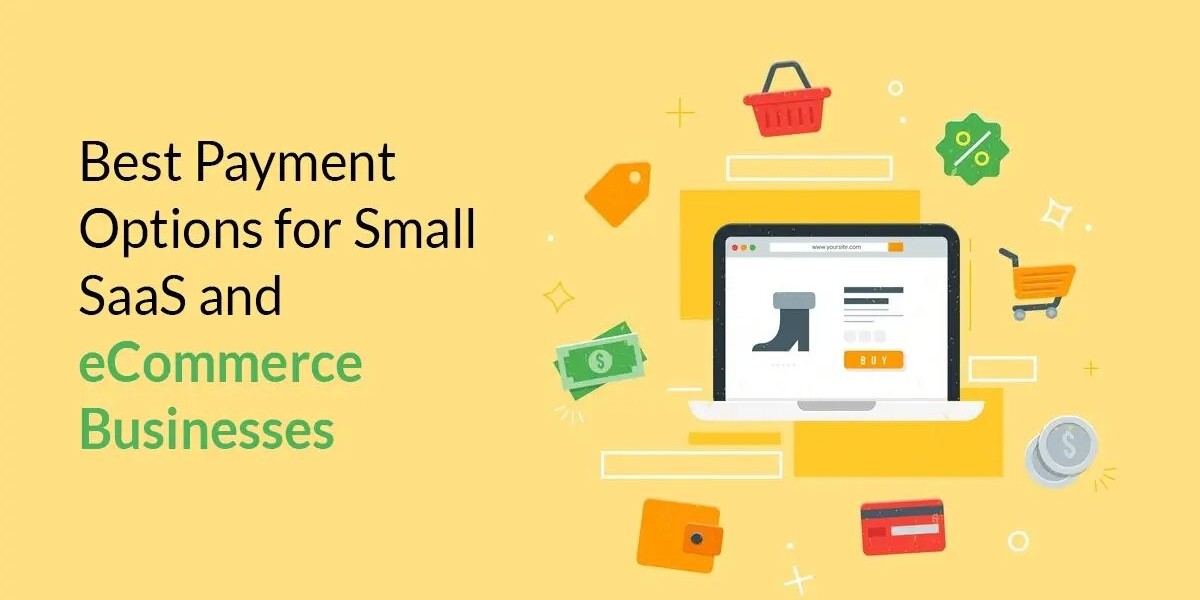As small SaaS (Software-as-a-Service) and eCommerce businesses grow, selecting the right payment options becomes crucial. A streamlined payment process not only impacts customer experience but also ensures reliable revenue generation. With countless payment methods available, businesses need to choose options that fit their operational needs, customer preferences, and scalability goals.
In this blog, we’ll explore the most suitable payment options for small SaaS and eCommerce businesses, helping you decide which solutions to integrate into your business for smooth transactions.
1. Credit and Debit Card Payments
Credit and debit card payments remain the most popular payment option worldwide. For SaaS and eCommerce businesses, accepting card payments is essential as customers expect the convenience of paying with their Visa, Mastercard, or American Express.
Benefits:
- Global acceptance: Customers from different regions can easily make purchases using their cards.
- Recurring payments: SaaS businesses, especially subscription-based, can utilize card-on-file features to facilitate recurring billing.
- Faster checkout: Card payments are quick, enhancing the customer experience.
Popular Providers:
- Stripe: Known for its robust API and ease of integration, Stripe is a go-to choice for many startups and small businesses.
- PayPal: Beyond its direct payment options, PayPal allows customers to pay with their cards without needing an account, expanding its usability.
2. Digital Wallets
Digital wallets like PayPal, Apple Pay, Google Pay, and Amazon Pay have rapidly gained popularity, particularly among mobile shoppers. Offering these wallets as a payment option can greatly enhance customer experience, especially for mobile-savvy audiences.
Benefits:
- Convenience: Digital wallets allow customers to store card details securely, speeding up the payment process.
- Security: Enhanced security features such as two-factor authentication and encryption make transactions more secure.
- Frictionless mobile payments: Customers can complete transactions in just a few clicks, improving mobile shopping experiences.
Popular Providers:
- PayPal: Widely trusted, PayPal is integrated with most platforms, making it easy for small businesses to adopt.
- Apple Pay/Google Pay: Available on iOS and Android devices, these wallets are secure and preferred by mobile users.
3. Bank Transfers (ACH Payments)
Bank transfers, including Automated Clearing House (ACH) payments, are popular for B2B SaaS businesses that handle larger transactions. ACH payments allow customers to transfer funds directly from their bank account to the merchant's account.
Benefits:
- Lower transaction fees: Compared to credit card processing fees, ACH payments are more cost-effective.
- Suitable for large payments: B2B SaaS businesses with high-value invoices benefit from the ease of handling large transactions.
- Recurring billing: ACH can be automated, making it a good fit for subscription-based businesses.
Popular Providers:
- Dwolla: Specializes in ACH transfers, offering a simple API integration.
- Plaid: Allows businesses to connect directly with users’ bank accounts for seamless transfers.
4. Buy Now, Pay Later (BNPL)
Buy Now, Pay Later options like Klarna, Afterpay, and Affirm are becoming increasingly popular among eCommerce businesses. These payment options allow customers to pay for their purchases in installments, making them more accessible to budget-conscious buyers.
Benefits:
- Increased sales: Offering flexible payment terms can reduce cart abandonment rates and boost sales.
- Appeal to younger consumers: BNPL is especially popular among millennials and Gen Z customers who prefer splitting payments.
- No risk for merchants: Merchants receive the full payment upfront, while the BNPL provider handles installment collections from the customer.
Popular Providers:
- Klarna: A leading BNPL provider with global reach and multiple payment options.
- Afterpay: Commonly used by eCommerce stores to offer flexible payment terms to their customers.
5. Cryptocurrency Payments
While still niche, cryptocurrency payments are gaining traction, particularly among tech-savvy and privacy-conscious customers. Accepting Bitcoin, Ethereum, or other cryptocurrencies can be a unique selling point for certain customer demographics.
Benefits:
- Low fees: Cryptocurrency transactions typically have lower fees compared to traditional payment processors.
- International payments: Cryptocurrencies remove the need for currency conversion, making international payments simpler.
- Tech-savvy audience: Cryptocurrencies appeal to tech-forward customers who prefer decentralized payment methods.
Popular Providers:
- Coinbase Commerce: Allows businesses to accept various cryptocurrencies with easy integration.
- BitPay: Facilitates crypto payments and offers merchant tools for invoicing and settlement.
6. Third-Party Payment Gateways
For businesses looking for a ready-made payment solution, third-party payment gateways like PayPal, Square, and Shopify Payments offer a full suite of payment services. These platforms provide the infrastructure needed to process payments securely and efficiently.
Benefits:
- Easy setup: These gateways offer pre-built solutions, allowing businesses to get up and running quickly.
- Integrated fraud prevention: Built-in security measures protect businesses and customers from fraudulent activities.
- Comprehensive reporting: Most gateways provide real-time reporting and analytics to track transactions and trends.
Popular Providers:
- PayPal: Known for its ease of use and global reach, PayPal integrates with major eCommerce platforms.
- Square: Offers a comprehensive suite of payment tools for both online and in-person transactions, making it ideal for businesses with both physical and online presences.
7. Subscription Management Platforms
For SaaS businesses operating on subscription models, integrating with a subscription management platform is critical. These platforms handle recurring billing, dunning management, and revenue recognition, ensuring that businesses can scale while minimizing payment-related issues.
Benefits:
- Automated billing: Recurring payments are handled automatically, reducing the administrative burden on businesses.
- Revenue optimization: Platforms like SubscriptionFlow offer tools for dunning management, reducing churn due to failed payments.
- Multiple payment options: Subscription platforms allow businesses to offer various payment methods, from credit cards to ACH, improving flexibility for customers.
Popular Providers:
- SubscriptionFlow: Provides an all-in-one solution for managing subscriptions, recurring billing, and payments, making it a great choice for SaaS companies.
- Recurly: Specializes in subscription billing, offering robust tools for recurring payments and dunning management.
Conclusion
Choosing the right payment options for your SaaS or eCommerce business can impact customer satisfaction and long-term growth. A mix of traditional card payments, digital wallets, and newer options like Buy Now, Pay Later or cryptocurrency can help you cater to diverse customer needs. By integrating flexible and secure payment solutions, small businesses can increase conversion rates, reduce cart abandonment, and improve customer loyalty.
Ensure you select payment providers that align with your business’s growth goals, and prioritize a smooth, secure, and frictionless payment experience for your customers.










